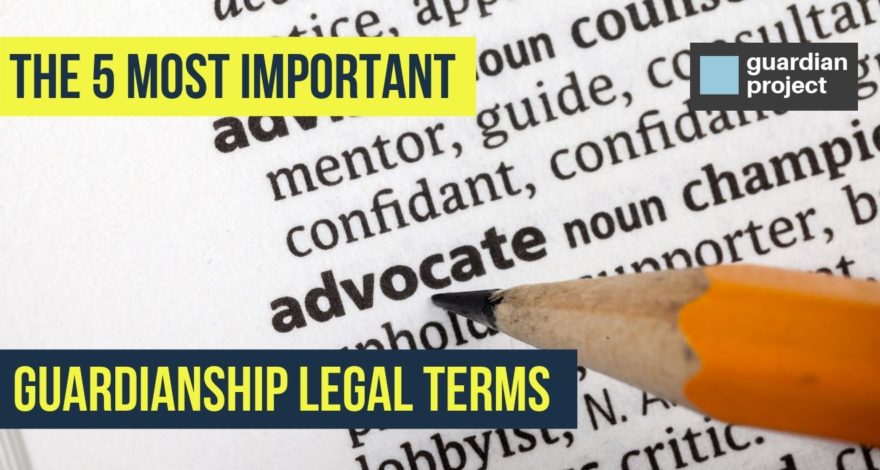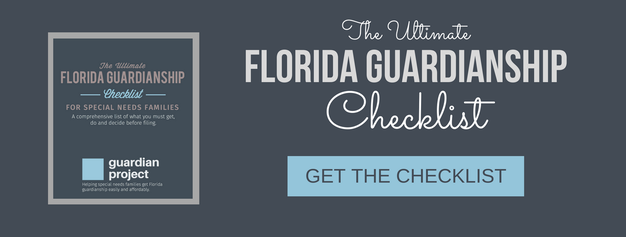Our video discusses the five most important guardianship legal terms for parents of a child with a developmental disability, and why you need to know them.
Every industry, every profession has its own “language.” Think about wherever you work, and the specialized terms, and acronyms you may use, and the disadvantage someone has if don’t know the basic jargon of your industry.
The law is no different. If anything, lawyers and judges – being perfectionists by nature – tend to be more particular than most when it comes to using correct legal terminology.
If you are getting guardianship — whether you end up hiring a lawyer, doing it on your own, or using a self-help service like our Online Guardianship Workshop — you are going to be making important decisions about the care of your child, and will be dealing with the courts –possibly for decades.
To make informed decisions, it’s imperative that you begin to learn basic legal terms so when you speak with lawyers, or the court, you are using the same language. If you don’t, you risk making mistakes that can be very time consuming, and costly, to fix down the road.
In our guardianship glossary, we’ve put together a list of all of the terms you need to know, but we did it in one very unique way: all of the definitions were written specifically for parents seeking guardianship of a child with a disability.
Based on my experience representing clients in guardianship cases, here are the top 5 terms you need to know:
1. Ward
The person for whom the guardianship petition is filed is called the “Ward”.
In the case of a special needs parents, this is your child with a disability.
The “ward” is one of the most frequently used terms in a guardianship proceeding. For a parent, it sounds a little, well, cold, even demeaning. But don’t take offense to it, it’s just the court’s way of identifying the person who is the subject of the guardianship.
2. Petition/Petitioner
When people use the word “Petition”, frequently they are talking about a document that many people sign to get some authority figure to make some kind of change. It tends to have a somewhat negative connotation.
In the case of guardianship, a “petition” is merely a is a fancy word for an application. It’s the formal written document you file to the court that asks the court to begin the guardianship process for your child. As the person filing the petition, you may be referred to as the “petitioner”. In the context of guardianship, this word’s connotation is neither negative nor positive.
3. Letters
This is not a note that you send in the mail to your cousin. “Letters” is the official document given to you by the court when your application for guardianship (remember, your petition) is approved by the court. The Letters, also called the Letters of Guardianship, is the document you will bring with you to doctor appointments and meetings with other important people with whom you deal with on behalf of our child.
4. Guardian Advocate
You know that you need to get guardianship for your child when they turn 18, but what you may not know is that, if your child has a developmental disability, there is an expedited process for getting guardianship in Florida, called a Guardian Advocate proceeding.
You end up with the same rights as a traditional guardianship, but if your child has a disability such as autism, spina bifida, down syndrome or an IQ lower than 70, the judge can grant guardianship from a doctor’s diagnosis and an IEP as opposed to appointing a panel to determine your child’s competency.
Oh, and one more thing, unlike traditional guardianship, in most cases there’s no need to hire a lawyer to become a guardian advocate.
5. Oath
Many of the documents you file with the court must be signed “under oath.” What’s important about this is not the procedure for signing, but the consequences for lying. You will have to answer many personal questions in your guardianship application.
Always answer truthfully, because if it’s discovered that you intentionally lied to the court, you could be subject to criminal prosecution for perjury.
Conclusion
There are dozens of other guardianship legal terms you should be familiar with.
Check our every guardianship legal term in our Guardianship Glossary.

